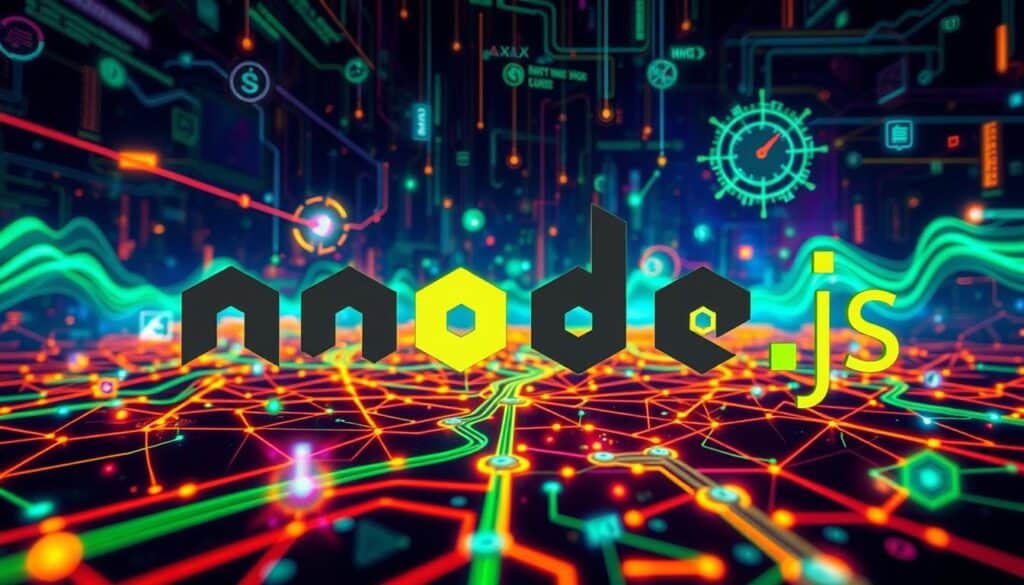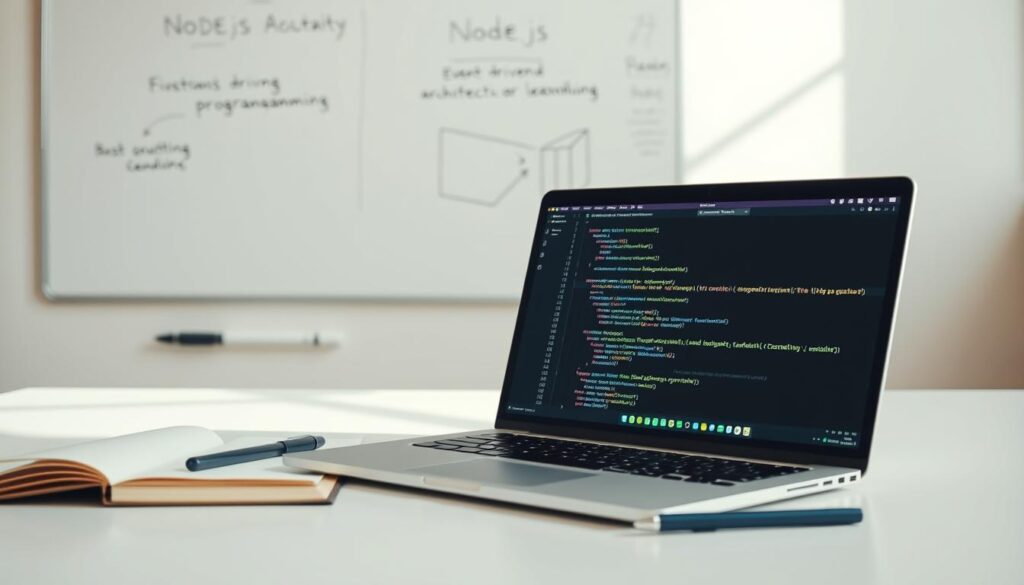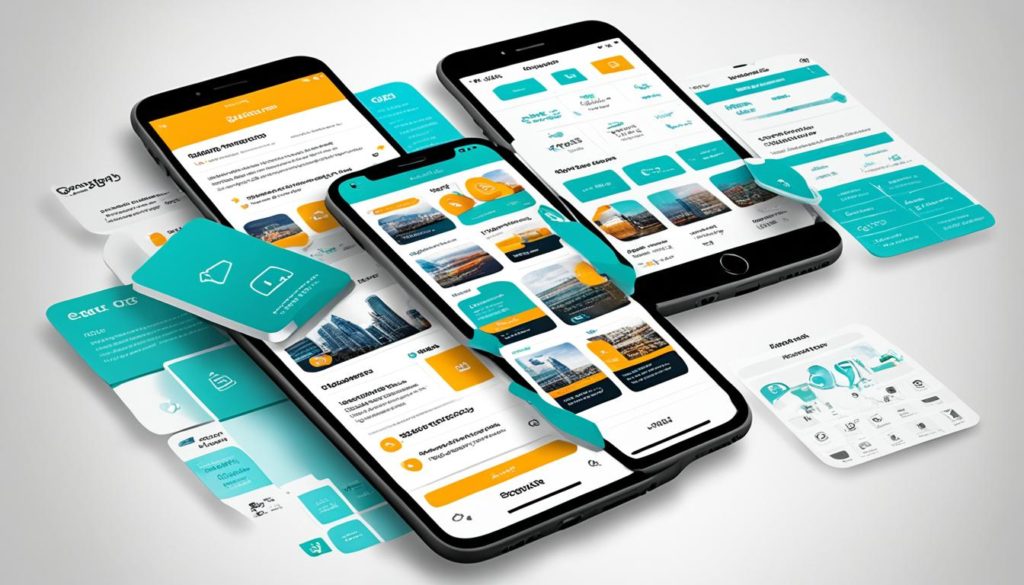Did you know that Node.js is behind giants like LinkedIn, Netflix, Walmart, Uber, PayPal, and NASA? These big names use Node.js for its strong features, fast performance, and ability to grow. Knowing Node.js well is key to making a difference in tech.
Our guide has over 50 Node.js interview questions and answers for both newbies and pros. You’ll learn about Node.js’s core and get ready for today’s tech challenges.
Whether you’re into full-stack or backend, knowing these Node.js technical interview questions is crucial. We’ll cover asynchronous programming, event-driven architecture, and more. This will get you ready for your next big chance.
Key Takeaways
- Node.js powers major companies like LinkedIn, Netflix, and Uber, emphasizing its industry relevance.
- Our guide includes over 50 essential Node.js interview questions and answers for freshers and experienced professionals.
- Understand the significance of npm, Node Package Manager, in managing dependencies and version control.
- Express.js stands out as the most popular Node.js framework for its scalability and efficiency.
- Get insights on handling asynchronous programming in Node.js with callbacks, Promises, and async/await syntax.
Introduction to Node.js and Its Popularity
Node.js is a big deal in the tech world for making server-side apps. But what is Node.js, exactly? It’s a strong platform that runs JavaScript outside the browser. It uses Google Chrome’s V8 engine to boost performance and grow.
Its design is all about handling I/O operations well. This makes it perfect for real-time apps, microservices, and APIs.
Big names like LinkedIn, Netflix, and NASA love Node.js. They use it to handle lots of requests at once. This is key for fast and efficient apps. Learn more about Node.js here.
Developers love Node.js for its huge library of packages and modules. This makes coding faster and easier. Express.js is a top example, making server app development simpler with features like routing and HTTP request handling.
Node.js is also great for high-performance apps. It doesn’t slow down when doing tasks. This is thanks to its non-blocking nature and asynchronous programming.
In a Node.js project, a package.json file is key. It manages project details, dependencies, and scripts. A .env file, loaded via dotenv, handles environment settings. These features make Node.js a top pick for building fast, scalable apps.
Core Concepts of Node.js
Getting to know Node.js basics is key for success in this field. We’ll explore event-driven architecture, asynchronous programming, and npm. Node.js uses a single-threaded event loop for non-blocking I/O. This makes it great for handling many requests at once.
Node.js is built on event-driven architecture for better performance and scalability. This design means operations are done asynchronously, keeping servers fast. Understanding callbacks and promises is essential for managing these operations. Promises are cleaner and safer than callbacks.
Modules and npm are also crucial. Modules help organize code into reusable parts, making development easier. npm helps manage project dependencies with commands like npm install and npm update.
This guide shows how important try…catch blocks and async/await are for error handling. They make our code stronger and easier to keep up. Streams and buffers are also key for handling data flows and binary data.
| Concept | Description |
|---|---|
| Event-Driven Architecture | Handles operations asynchronously to boost performance and enable scalable network applications. |
| Modules | Organize and encapsulate code into reusable components, enhancing development efficiency. |
| npm | A package manager that supports code sharing, dependency management, and offers various commands. |
| Asynchronous Programming | Enables concurrent operations using callbacks, promises, and async/await for streamlined processes. |
| Streams | Provide a mechanism for handling data continuously, including readable, writable, and duplex streams. |
| Buffers | Represent raw binary data efficiently, useful for data streams like network requests or file I/O. |
Common Node.js Interview Questions for Freshers
When you’re getting ready for a Node.js interview, you’ll likely face questions that cover the basics. These questions often ask about Node.js’s core concepts. This includes its single-threaded nature, non-blocking I/O, and how it handles operations asynchronously.
It’s important to know about the V8 Engine, which is used by Node.js. This engine, made by Google, helps JavaScript run fast. Also, understanding the event loop is key. It lets Node.js handle many tasks without starting new threads, making it scalable.
Here are some basic questions to expect in a Node.js interview:
- What is Node.js, and how does it differ from JavaScript?
- Explain the single-threaded event loop in Node.js.
- What are the different modules in Node.js?
- How do you handle asynchronous operations in Node.js?
- Explain the usage of the V8 Engine in Node.js.
Since Node.js is used for real-time web apps, network apps, and distributed systems, you might be asked about specific projects. This includes IoT projects, real-time chats, and streaming services. Knowing about these can show you’re ready for practical work.
| Feature | Description |
|---|---|
| Asynchronous Non-blocking I/O | Handles operations asynchronously to maintain performance. |
| Event Loop | Allows Node.js to handle multiple tasks without multithreading. |
| Single-Threaded | Uses one thread for handling requests with internal multitasking capabilities. |
| V8 Engine | Google’s engine that ensures fast JavaScript execution. |
| libuv | C library that supports asynchronous I/O operations. |
Understanding these Node.js basics well is crucial for any fresher. It will help you do well in your Node.js interviews and start a successful career in development.
Tips to Ace Node.js Technical Interviews
When getting ready for Node.js interviews, knowing both basic and advanced concepts is key. Good preparation strategies mean practicing coding and keeping up with Node.js updates. You should understand the basics like Node.js features, modules, and how to handle errors.
Also, diving into topics like asynchronous programming, file operations, and setting up HTTP servers is important. These areas are crucial for your prep.
Sharing your practical experiences can really help. Showing off your work on open-source projects or a Node.js app portfolio is impressive. Talking about challenges you’ve faced and how you solved them proves your skills.
Knowing the current tech scene is also beneficial. Big names like Netflix, LinkedIn, and NASA use Node.js. This shows its importance and wide use. As mentioned in this Node.js interview prep guide, knowing a lot and having experience is essential. Many have landed big jobs, with some offers reaching $1.267 million.
In short, good prep with real-world coding, staying current with Node.js, and knowing its uses can boost your interview success. With a solid plan and showcasing your experience, we’re set to ace our Node.js interviews.
FAQ
What is Node.js?
Node.js is a powerful server-side platform. It runs JavaScript with Google Chrome’s V8 engine. It helps create fast, scalable network apps with its unique architecture.
Why is Node.js popular in the tech industry?
Big names like LinkedIn, Netflix, and NASA use Node.js. It’s great for handling many requests at once. Its rich ecosystem and efficiency make it top for web app development.
What are some core concepts of Node.js?
Node.js is all about event-driven architecture and asynchronous programming. It uses the V8 Engine and an event loop. Its non-blocking I/O model lets it handle lots of connections at once.
What is npm and how is it related to Node.js modules?
npm is Node.js’s package manager. It makes sharing and reusing code easy. It helps manage dependencies and publish modules, making development more efficient.
What are some common Node.js interview questions for freshers?
Freshers might face questions like “What is Node.js?” and “How does it handle async operations?” Knowing the event loop and V8 Engine is key.
What preparation strategies can help ace a Node.js technical interview?
Master both basic and advanced Node.js concepts. Practice coding and stay current with Node.js updates. Show your skills with open-source projects or a Node.js portfolio. Talking about challenges you’ve overcome can boost your interview score.
Future App Studios is an award-winning software development & outsourcing company. Our team of experts is ready to craft the solution your company needs.










